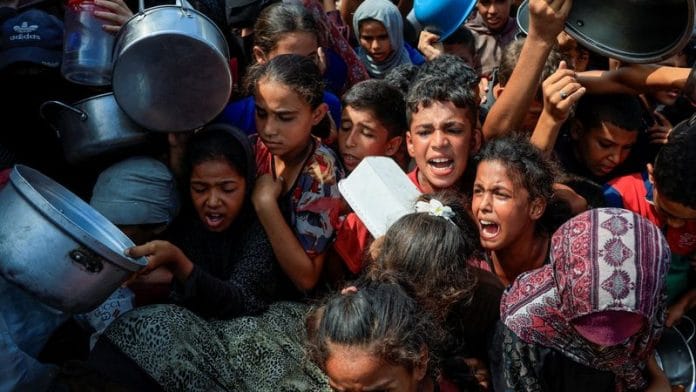United Nations: Famine has struck an area of Gaza and will likely spread over the next month, a global hunger monitor determined on Friday, an assessment that will escalate pressure on Israel to allow more humanitarian aid into the war-torn Palestinian enclave.
The Integrated Food Security Phase Classification system said 514,000 people – nearly a quarter of Palestinians in Gaza – are experiencing famine and that was due to rise to 641,000 by the end of September.
Some 280,000 of those people are in a northern region covering Gaza City – known as Gaza governorate – which the IPC said was in famine, its first such determination in the enclave. The rest are in Deir al-Balah and Khan Younis – central and southern areas that the IPC projected would be in famine by the end of next month.
For a region to be classified as in famine at least 20% of people must be suffering extreme food shortages, with one in three children acutely malnourished and two people out of every 10,000 dying daily from starvation or malnutrition and disease.
Even if a region has not yet been classified as in famine because those thresholds have not been met, the IPC can determine that households there are suffering famine conditions, which it describes as starvation, destitution and death.
The IPC analysis comes after Britain, Canada, Australia and many European states said the humanitarian crisis had reached “unimaginable levels” after nearly two years of war between Israel and Palestinian militants Hamas. U.N. Secretary-General Antonio Guterres has long warned of an “epic humanitarian catastrophe” in the enclave of more than 2 million people.
U.S. President Donald Trump last month said many people there were starving, putting him at odds with some in his Republican party, who have staunchly supported Israeli Prime Minister Benjamin Netanyahu’s position that there was no starvation.
ISRAEL CONTROLS GAZA ACCESS
Israel controls all access to Gaza. COGAT, the Israeli military agency that coordinates aid, on Thursday accused Hamas of a “false starvation campaign” and said the U.N. and others were spreading unfounded claims about hunger in Gaza. In a video on X, COGAT disputed that there was famine in Gaza.
The U.N. has long complained of obstacles to getting aid into Gaza and distributing it throughout the war zone, blaming impediments on Israel and lawlessness. Israel has been critical of the U.N.-led operation and accuses Hamas of stealing aid, which the militants deny.
The IPC said the analysis released on Friday only covered people living in Gaza, Deir al-Balah and Khan Younis governorates. It was unable to classify North Gaza governorate due to access restrictions and a lack of data and it excluded any remaining population in the southern Rafah region as it is largely uninhabited.
It is the fifth time in the past 14 years that a famine has been determined by the IPC – an initiative involving 21 aid groups, United Nations agencies and regional organizations that is funded by the European Union, Germany, Britain and Canada.
The IPC has previously assessed that there was famine in areas of Somalia in 2011, South Sudan in 2017 and 2020, and Sudan in 2024. The IPC says it does not declare famine, but instead provides analysis for governments and others to do so.
A Reuters/Ipsos poll released this week found that 65% of Americans believe the United States should help those starving in Gaza.
Israel has long counted on the U.S., its most powerful ally, for military aid and diplomatic support. An erosion of U.S. public support would be a worrisome sign for Israel as it faces not only Hamas militants in Gaza but unresolved conflict with Iran, its regional arch-foe.
The war in Gaza was triggered on October 7, 2023, when Hamas killed 1,200 people in southern Israel and took some 250 hostages, according to Israeli tallies. Since then, Israel’s military campaign has killed more than 62,000 Palestinians, according to Gaza health authorities.
The United States, Qatar and Egypt have been trying to broker an end to the conflict.
This report is auto generated from the Reuters news service. ThePrint holds no responsibility for its content.
Also Read: EAM Jaishankar calls on Russian President Putin






